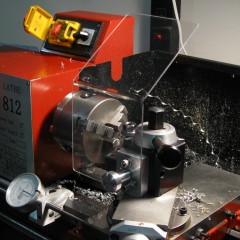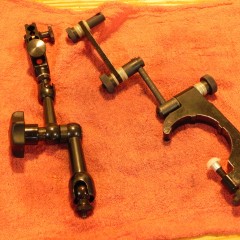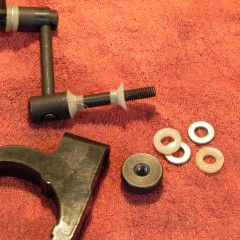Shortly before Christmas I acquired a new tool for the shop, a Baldor 8100W 8″ slow speed grinder. For almost a decade, I’ve used a no-name 6″ grinder for all my tool sharpening needs. While it always got the job done, it was never a tool I enjoyed using, so the Baldor is going to be a substantial upgrade in more ways than one. In this first video of what will be short series, I discuss truing up the stock flange washers supplied by Baldor, and I show how I made a steel bushing for mounting an aftermarket aluminum oxide wheel.
Continue Reading…
While I love having a shop, one of the few things that I don’t like about mine is the lighting. It’s a 2 car garage with no windows, and while I’ve upgraded the lighting over the years, ceiling lights are only capable of so much. For example, if I’m turning a deep wood bowl, its hard to see the tip of the cutting tool. This is potentially dangerous because you have a higher chance of a catch when you can’t see what you are doing. On my mill, safety is less of a concern, but not being able to see the work, can turn a simple task into a choir.
The best way to fix this type of issue is to use task lights, so you can aim the light right where you need it most. Task lights range in price from “um OK”, to “holly hell”. Decent lights that use incandescent bulbs start around $50, and models that use LED lights seem to hover around $200. If I was spending 8 hours a day 5 days a week standing at a machine I’d probably just buy a good light. However, I’m a hobbyist and probably spend no more than 4 hours a week in the shop on average, so I wanted a cheaper solution. Continue Reading…
My latest project was to cleanup and mount my birthday present to myself, A Lathemaster 5″ 5C tru-setting chuck. I made two mods right off the bat, studs for mounting it to the spindle, and brass tip set screws for adjusting the run out. Overall I’m very please with the chuck, considering the price point. In the video I demonstrate how to hold threded parts in a 3 jaw chuck, without mangling the threads. I also show some finishing inserts, that work really well on small lathes like mine.
My latest project, Is one I have wanted to check off the list for a long time. My lathe didn’t come with a 4 jaw chuck, and I’ve always found workarounds when I needed one, so recently when I came across a good deal on a chuck, I snatched it up. Since my lathe doesn’t use a standard chuck mounting scheme, I had to turn a custom back plate to mount the chuck. Making a back plate is usually a fairly easy task, but since I didn’t have a chuck big enough to hold the back plate blank, I had to devise a work holding scheme using my face plate. This video documents the steps I used to make the back plate.
A while back, Tom Lipton did a video on mating a Noga arm to an Indicol body. Last weekend, I decided I wanted one, and set about making one. I used that arm of a a Noga NF61003, and an import Indicol.
The first step, was to take them apart, and see what I was working with. The arm was fastened to the base with a short M5 thread, that was surprisingly tight for something so small. The Indicol, was as you would expect not much to look at. The knurled nuts, were actually pretty decent, but the bushings & washers, where both pretty poor.
The first machining step was to create a clean reference surface on the Indicol, and to bore out the arm mounting point so that I could fit some brass bushings to it. I made the bushings, because the idea of a steel shaft running inside of a cast aluminum hole wasn’t something I thought vary highly of. Continue Reading…



